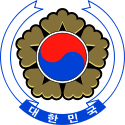- South Korean by-elections, 2011
-
South Korea 
This article is part of the series:
Politics and government of
South KoreaGovernment National Assembly
political parties
GNP · DEP · LFP · FHA · DLP · PPP · NPPElections Presidential elections
1997 • 2002 • 2007Legislative elections
2000 • 2004 • 2008Local elections
2002 • 2006 • 2010By-elections
2011Related topics Korean reunification
Sunshine Policy
Administrative divisions
Human rights
Foreign relations
The two South Korean 2011 by-elections took place on April 27th, 2011 in 38 electoral districts across the country and on October 26th, 2011 in Seoul after Oh Se-hoon resigned due to his failure in the Seoul Free Lunch Referendum.
Contents
April 27th
October 26th
The main focus of the October by-election was about filling the vacant seat of the mayor of Seoul. The election was eventually won by an independent candidate Park Won-soon against the Grand National Party candidate, Na Kyung-won. On an anecdotal view, an unnamed representative of an electoral district in Seoul said that the general public mood against the Grand National Party was closely similar to political events in 2004, when former president Roh Mu-hyun was on the verge of being impeached.[1]
Impact
Blue House
The Blue House under the Lee Myung-bak government has been negatively impacted the most. President Lee Myung-bak did not make any official commentary right after the election's result due to a real estate dispute and due to the growing younger voters' opposition against him.[2]
Grand National Party
This October by-election is known to have a negative impact on the right wing political establishments in South Korea, notably Lee Myung-bak government and the Grand National Party. Grand National Party politician, Jeon Yeo-ok, made a remark that "the Grand National Party is a party that betrays its supporters" after the loss.[3] The youth faction of the GNP made a suggestion to rename the party to another name to avoid criticisms.[4] There has been a growing pessimistic outlook for the Grand National Party. Former Prime Minister and current head of the Presidential Commission for Shared Growth for Large and Small Companies, Chung Un-chan, mentioned in the GNP Incheon branch seminar on November 17th how "the GNP doesn't receive any affection" and "would most likely lose the next presidential election".[5] Some high-profile GNP members deny that this by-election is a loss. For instance, chairperson Hong Jun-pyo responded as "neither a win nor a loss".[6] Hong's comment later triggered backlashes among other GNP members, including Won Hee-ryong.[7]
References
- ^ Im (임), In-taek (인택) (2011-10-27). "지금 총선 치르면, 한나라 서울의원 40명중 33명 배지 잃어" (in Korean). The Hankyoreh. http://www.hani.co.kr/arti/politics/politics_general/502849.html. Retrieved 2011-11-19.
- ^ Tae (태), Weon-jun (원준) (2011-10-27). "[선택, 10·26 재보선] 젊은층 反MB 정서 확인…청와대 ‘할 말 없다’ 침통" (in Korean). Kuki News. http://news.kukinews.com/article/view.asp?page=1&gCode=kmi&arcid=0005494642&cp=du. Retrieved 2011-11-19.
- ^ Hwang (황), Cheol-hwan (철환) (2011-10-27). "전여옥 "한나라, 지지자 배신한 배신정당"" (in Korean). Yonhap News. http://www.yonhapnews.co.kr/bulletin/2011/10/27/0200000000AKR20111027105000001.HTML. Retrieved 2011-11-19.
- ^ Kim (김), Seong-hwan (성환) (2011-10-28). "한나라 소장파 "문패 바꿔야"" (in Korean). Hankook Ilbo. http://news.hankooki.com/lpage/politics/201110/h2011102802390621000.htm. Retrieved 2011-11-19.
- ^ Yoo (유), Dong-guen (동근) (2011-11-17). "“한나라 2012년 선거 해보나마나” 운찬 쓴소리에 강연장 소란" (in Korean). Nocut News. http://news.kukinews.com/article/view.asp?page=1&gCode=pol&arcid=0005566163&code=11121100. Retrieved 2011-11-19.
- ^ Hwang (황), Cheol-hwan (철환) (2011-10-26). "홍준표 "이겼다고도 졌다고도 할 수 없어"" (in Korean). Yonhap News. http://www.yonhapnews.co.kr/bulletin/2011/10/26/0200000000AKR20111026237000001.HTML. Retrieved 2011-11-19.
- ^ Shin (신), Jeong-hun (정훈) (2011-10-29). ""진 게 아니라니…" 당내서도 홍준표 난타" (in Korean). Hankook Ilbo. http://news.hankooki.com/lpage/politics/201110/h2011102902361621000.htm. Retrieved 2011-11-19.
 Elections and referendums in South Korea
Elections and referendums in South KoreaPresidential elections 1948 · 1952 · 1956 · 1960 (Mar) · 1960 (Aug) · 1963 · 1967 · 1971 · 1972 · 1978 · 1979 · 1980 · 1981 · 1987 · 1992 · 1997 · 2002 · 2007 · 2012Legislative elections Local elections 1952 · 1956 · 1960 · 1991 · 1995 · 1998 · 2002 · 2006 · 2010 · 2014By-elections 2011- Constitutional Assembly
Categories:- 2011 elections
- 2011 in South Korea
Wikimedia Foundation. 2010.
